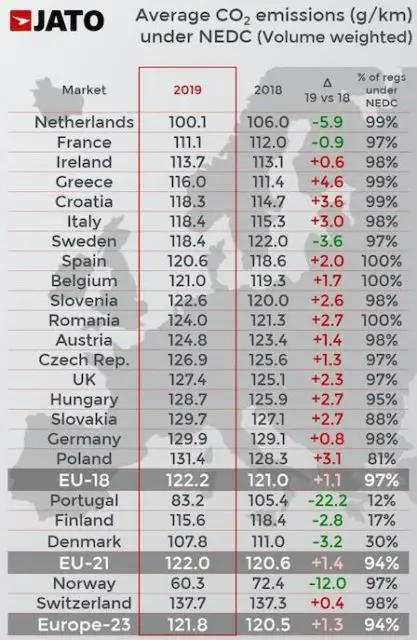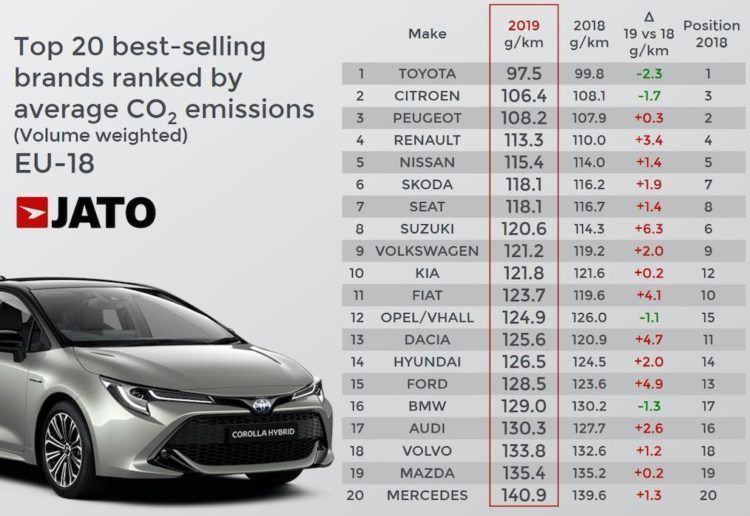In full-year 2019, car CO2 emissions in Europe increased overall to a five year high with increases in most countries and for most brands.

In 2019, volume-weighted average CO2 emissions emitted by all new passenger vehicles registered for the first time during 2019 in the European Union increased by 1.3 g/km to a five-year high of 121.8 g/km. Average CO2 emissions increased in most countries with Switzerland, Poland, and Germany driving the heaviest polluting new cars. Norway, Portugal, the Netherlands, and Denmark had the lowest CO2 emissions. Of the top 20 best-selling car brands in Europe in 2019, Toyota had the lowest average CO2 emissions and Mercedes-Benz the highest. The increase in CO2 emissions was largely due to the increased popularity of heavier SUVs, the trend away from diesel, and a rush by manufacturers to sell dirtier vehicles before heavy fines are issued from 2020 onwards.
CO2 Car Emissions in Europe in 2019

In 2019, the volume-weighted average CO2 emissions for European markets increased for the third consecutive year to reach the highest recorded levels since 2014. According to data from JATO Dynamics, the average for the 23 European markets totaled 121.8 g/km under the NEDC regime.
Felipe Munoz, global analyst at JATO Dynamics explained: “As expected, the combination of fewer diesel registrations and more SUVs continued to have an impact on emissions. We don’t anticipate any change to this trend in the mid-term, indeed these results further highlight the industry’s need to adopt EVs at a rapid pace to reach emissions targets.”
Although last year’s average was 1.3 g/km higher than in 2018, the increase was in fact lower than the difference between the 2017 and 2018 results – where the growth was 2.4 g/km. Despite an increase of EV models contributing positively to emission levels, the move away from diesel had a negative impact, one that the market could not offset. Munoz continued: “The average emissions of electrified vehicles, was 63.2 g/km, almost half that produced by diesel and petrol vehicles. The problem arose because EVs only accounted for 6% of total registrations, which is not yet a high enough figure to create a positive change.”
See also 2019 (Full Year) Europe: Electric and Plug-In Hybrid Car Sales per EU and EFTA Country.
Average CO2 Emissions by European Country in 2019

Four of the five major markets in Europe posted higher averages in 2019 than in 2018. Average emissions for Germany, Britain, Italy, and Spain increased, ranging from a rise of 0.8 g/km for Germany to an increase of 3.0 g/km for Italy. This was in part caused by marked changes in attitude and regulations around the use of diesel fuels which has had the unintended consequence of pushing people to drive higher CO2 emitting petrol vehicles. France was the only market to see better results, as its average fell from 112.0 g/km in 2018, to 111.1 g/km last year. Despite this positive change, their emission levels were still higher than the averages they recorded in 2016 and 2017.
Pure electric cars have a 2% market share in France, this being the highest share among all five major markets. France is therefore leading the way in showing how electric cars can have a measurable impact on emissions levels, despite their adoption still lagging behind diesel and petrol counterparts. France has seen this higher level of market penetration in part due to the adoption of more affordable cars like the Renault Zoe, which is soon to be followed by the arrival of the Peugeot 208-e. Munoz noted: “Neither the Germans nor the Italians offer pure electric subcompacts within their product line up. These cars can make a huge difference to consumer attitude.”
Despite the environmentally aware image that the Swiss likes to cultivate, new cars registered in Switzerland in 2019 were by far the highest polluting passenger vehicles in Europe. Similarly, Germany was the second-highest-polluting new car market in the European Union in 2019 – partly due to the increased popularity of SUVs but also the continued high-performance cars that the German carmakers profitably sold to consumers.
Lower Emissions in Smaller European Countries
Smaller countries generally lead with cleaner cars in Europe. This is largely due to the popularity of smaller cars in these countries but also government policies specifically encouraging smaller and cleaner cars. Norway has been the leader for electric car market penetration for years and remained by far the lowest new car CO2 emitter in Europe in 2019.
The other markets recording large improvements in emissions levels were Sweden and the Netherlands. The latter reduced its average by 5.9 g/km, in turn becoming the country with the lowest result in the European Union. The improvement was due to their mix between diesel and pure electric cars. In 2018, for every BEV registered there were 2.3 diesel new cars in the Netherlands; one year later this changed significantly to 1.9 BEVs for every diesel car registered.
(This excludes Denmark, Portugal, and Finland who can’t be compared to other markets as they published the newer and more accurate WLTP data rather than NEDC values)
CO2 Emissions by Top Car Brands in Europe in 2019
None of the top 20 largest car brand in Europe in 2019 achieved average CO2 emissions below the 95 g/km required by the European Union from 2020. Currently, all carmakers in Europe seem destined to be fined with Volkswagen heading for the biggest fine overall due to the high volume of cars sold in Europe.

Toyota holds its position as the top 20 best-selling brand with the lowest average CO2 emissions in Europe in 2019. Alongside this, the Japanese manufacturer also saw the largest decrease since 2018, with its average falling by 2.3 g/km. Toyota’s success is largely based on its popular hybrid range, with registrations making up 60% of the brand total volume in 2019. Munoz stated: “Toyota is a pertinent case, particularly considering they don’t offer pure electric cars but are still ahead of their European peers who still have more electrification plans than actual products.”
In the group ranking, Toyota was a major leader, only behind Tesla. Along with Lexus brand, Toyota posted an average of 99.0 g/km of CO2 in 2019, 14.3 g/km less than the next best in the ranking, PSA. At group level, Nissan Group, Renault Group, Mitsubishi and Suzuki posted average emissions lower than the total market’s average of 121.8 g/km. Volkswagen Group, Europe’s largest carmaker recorded an average of 123.6 g/km.
Citroen’s position in the ranking is also noteworthy. It was the brand with the second-lowest average emissions and was the second-best performer. However, in contrast to Toyota, the improvement made was due to the efficiency of its gasoline engines, rather than the adoption of electrified ones. In fact, the arrival of the compact SUV C5 Aircross and its higher averages, was outshone by improvements in the gasoline engines of the C3 (-5.1 g/km), C3 Aircross (-4.7), C1 (-4.5).
SUVs Increase CO2 Emission in Europe in 2019
SUVs were the biggest driver of growth in terms of volume and profits for European markets in 2019. Thanks to their popularity and their shared development costs with traditional cars, many OEMs have been able to increase their sales and increase profit margins. However, the popularity of SUVs is having a negative impact on the average emission levels, and this is evident in the average CO2 emissions when analyzed by segment.
The average CO2 emissions for SUVs was 131.5 g/km, which was higher than emissions posted from city-cars (107.7 g/km), subcompacts (109.2 g/km), compacts (115.3 g/km), midsize (117.9 g/km), and executive cars (131 g/km). In addition to this, SUVs made up 38% of total registrations in EU-18. Munoz highlighted: “The SUV segment of the market urgently needs more electrified models. To date, the focus for EVs has been on traditional hatchbacks and sedans, leaving very few choices in the SUV market. If these vehicles want to keep gaining traction and avoid future sanctions, they need to be electrified.”
The fines from 2020 for all new cars sold in the EU is roughly €95 per g/km above the 95 g/km target – electric and low emission cars give special credits. Many industry watchers expect these fines to give electric cars a bigger boost in Europe than any amount of government incentives of environmental campaigns.
European Car Sales Statistics for 2019 (Full Year)
- 2019 (Full Year) Europe: Car Sales and Market Analysis
- 2019 – Car Sales per EU and EFTA Country (including market overview)
- 2019 – Europe: Best-Selling Car Manufacturers and Brands
- 2019 – Top 25 Best-Selling Car Models in the EU
- 2019 (Full Year) Europe: Car CO2 Emissions by Country and Brand
- 2019 (Full Year) Europe: Electric and Plug-In Hybrid Car Sales per EU and EFTA Country
